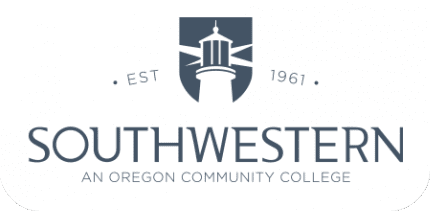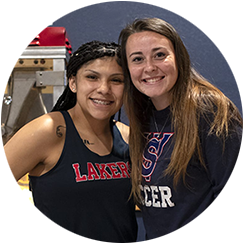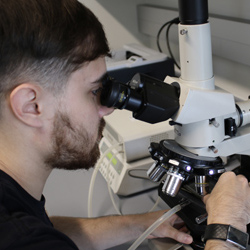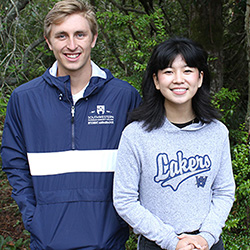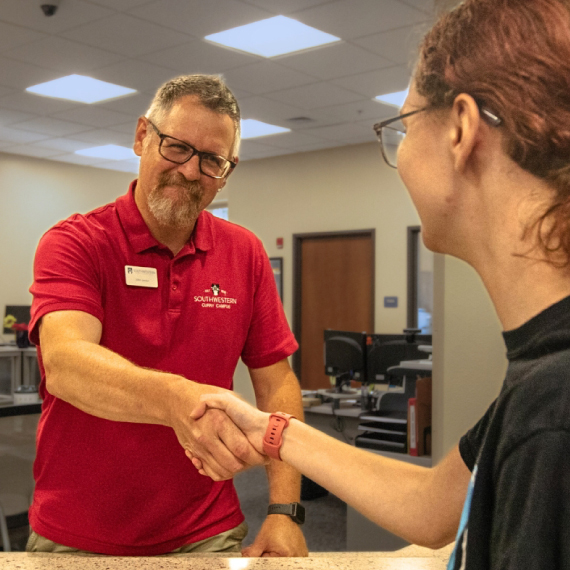Accessible Education Services
ADVISING & COUNSELING
ACCESSIBLE EDUCATION SERVICES
TESTING SERVICES
CONTACT US
Accessible Education Office
Monday-Friday 8 am – 5 pm
(Closed on Fridays during the summer)
Office: Dellwood Hall 7A
Phone: (541) 888-1578
Email
Important Information
Accommodations Consideration Process
Reasonable and Appropriate Accommodations
Reasonable and appropriate accommodations include a change that enables a student with a disability to enjoy equal opportunity and/or access to college facilities, programs, and activities, provided a fundamental alteration would not result from the accommodation.
Southwestern is not required to provide “best” or “most desired” accommodation, but is expected to provide reasonable accommodations sufficient to meet accessibility needs. The College is firmly committed to providing reasonable accommodations to those with properly documented needs to ensure equal access to all programs.
If you have a learning disability, a visual, hearing or mobility impairment, or a physical, mental health, or other invisible condition, you are encouraged to complete this form. Whether or not you are eligible for an accommodation, your completion of this form will assist the College in responding to your needs.
If you are requesting accommodations under the Americans with Disabilities Act (ADA) and/or section 504 of the Rehabilitation Act of 1973, you must provide documentation of the existence of a disability which substantially limits a major life activity.
Accommodations Request
Current and prospective students interested in accessing and implementing course accommodations at Southwestern have a few steps to complete in the accommodations consideration process:
- Fill out the Student Accommodation Request Form. You will need to login with your Southwestern email account.
- Schedule an Intake Appointment.
- Complete and submit the SWOCC Provider Accommodation Form with your medical or mental health provider, which will be distributed to you and/or your provider following your intake meeting. If you have a previous 504 plan or Individualized Education Plan (IEP), you can submit the most recent copy you have to the office. If submitting an IEP, please include your psychoeducational/evaluation report.
- Once documentation is received by the Accessible Education Office, the Director of Accessible Education will reach out to you via your Southwestern email to schedule your Accommodations Approval appointment.
Complaint Process
If you are a student, employee or a member of the public with a disability and have a complaint related to the disability, you may fill out the Complaint Reporting Form.
More information can be found here:
College Complaint and Investigation – Students or Community Member
Faculty and Staff Conduct Complaint and Investigation
Service Animals
Southwestern Oregon Community College (SWOCC) is committed to serving and supporting people who require the use of service animals on campus.
Service Animals:
Under the ADA, a service animal is defined as a dog or miniature horse, that is individually trained to do work or perform tasks for people with disabilities (includes physical, sensory, psychiatric, intellectual, or other mental disability.) The task(s) performed by the animal must be directly related to the person’s disability.
Except in rare circumstances, service animals are allowed access to all areas of SWOCC’s campuses that are open to the public and students. Service animals do not need an accommodation or be affiliated with the Accessible Education Services office.
Service Animal Handler’s Responsibilities:
SWOCC is not responsible for the care or supervision of service animals.
- Service animals must be accompanied and under leash or voice control at all times.
- The handler is responsible for the behavior of their service animal. Unacceptable behaviors such as uncontrolled barking, jumping, sniffing, growling, and whining, not related to the service the animal is providing are prohibited.
- The handler is responsible for feeding, walking, and cleaning up after their service animal whenever the animal is on campus.
- The handler must be compliant with any laws pertaining to animal vaccinations, licensure, ID tags, etc., that are mandated by State and/or local ordinances.
- Identification is not required, but it is recommended that a service animal wear recognizable identification. This will help others know that the animal is working and not a pet.
SWOCC may restrict, even exclude, a service animal in certain instances such as:
- The service animal is out of control and the handler has not made effective actions to control it.
- The service animal is not housebroken.
- The service animal is a direct threat to the health and safety of others.
If a service animal is restricted or becomes excluded from SWOCC’s campuses, SWOCC gives the handler the option of continuing to enjoy its programs and services without having the service animal on the premises.
Faculty & Staff Guidance:
Faculty and staff may not inquire about a person’s disability, but when it is not obvious what service an animal provides, staff and faculty may ask two questions:
- Is the dog a service animal required because of a disability?
- What work or task has the dog been trained to perform?
Public Etiquette Towards Service Animals:
- Always speak to the handler, not to the service animal.
- Do not ask personal questions about the handler’s disability.
- Do not pet a service animal. It distracts them from the task at hand, and service animals may be protective.
- Do not feed the service animal.
- Do not separate or attempt to separate a partner/handler from their service animal.
- Do not hesitate to ask the handler if they would like assistance if the team seems confused about a direction to turn, an accessible entrance, entrance to an elevator, etc.
- Do not draw unnecessary attention to a service team.
Self-Advocacy and Responsibility
Self-advocacy is an essential part of living with a disability. People come to college with varying degrees and experience in learning how to self-advocate. Self-advocacy is also an important part of the course accommodation process. Following the accommodation approval process, students are expected to disclose the accommodations they would like to use in each class with their instructors. By letting your instructors hear from you that you want to use the approved accommodations, you are helping them help you!
Student Responsibilities
- Knowing your specific needs as they relate to your disability.
- Asking for help at the beginning of the quarter and not after you are failing.
- Letting your instructors know what accommodations you are using in their course.
- Understanding that you are responsible for choosing to learn or not.
- Using an assertive approach to ask for needed help. This means knowing what your needs are, being respectful and polite, and being patient with other people who are trying to understand and help.
Faculty Responsibilities
- Being informed of the laws that support students with disabilities in postsecondary schools.
- Providing reasonable, approved accommodations to students with documented disabilities.
- Contacting the Accessible Education Services office regarding questions about how to provide a requested accommodation or questions related to the accommodation process.
- Providing a positive environment where students are encouraged to self-advocate.
Student Resources & Funding Opportunities
This section provides links to valuable resources. Information is provided to help students learn about potential grants, scholarships and funding opportunities, computer software, resources and content that may be of use to students with disabilities, veterans, and post-secondary transition.
General Information
The following link can be useful for students, faculty, and administrators. It provides access to areas such as inclusive educational practices, universal design, accessibility, accessible distance learning, assistive technology, and more. Check it and explore what it has to offer!
Information for Students, Faculty and Administrators
Blanche Fischer Foundation
The Blanche Fischer Foundation is a private, nonprofit 501(c)(3) charitable organization founded through a trust established by the late Blanche Fischer, a native of Long Creek and long-time resident and benefactor of Lincoln City, Oregon.
The Foundation makes direct grants on behalf of Oregonians with physical disabilities. The aid may relate directly to the disability or toward fostering personal independence.
The Foundation was created in 1981 and since then it’s estimated that they have granted $1.5 million in individual grants to people with physical disabilities in Oregon. The average grant award is $600.
Applicants need to meet three criteria:
- Must be an Oregon resident
- Must have a disability of a physical nature
- Must demonstrate financial need
The application is available at their website, www.bff.org. It is also available via the US mail. Applications are mailed the same day they’re requested. Please call 503-246-4941 with any questions.
Screen Readers And Software
This section provides several links to learn more about assistive technology options such as screen readers and software that may be helpful to students.
- Demo of JAWS – Demo, free trial to try before you buy.
- NaturalReader – Demo, free trial to try before you buy.
- Ghost Reader for Mac – Free reader software for Mac.
- AdapTech Research Network – Updated database of free or inexpensive Computer Technologies for both windows and MAC, OS systems.
Transition From High School To College
Students with Disabilities Preparing for Postsecondary Education – Know your rights and responsibilities.
Schedule an Appointment
Questions about how accessible education services might be able to help you? Want to meet someone to help you navigate accessibility services? Both current and prospective students (including students attending our Coos Campus, Curry Campus, and online students) can make an appointment with an Accessible Education Services representative by simply clicking the link below. If you have any issues or questions, email accessibility@socc.edu or call 541-888-7405 for assistance.

